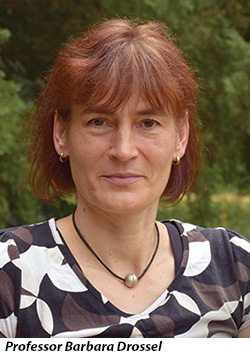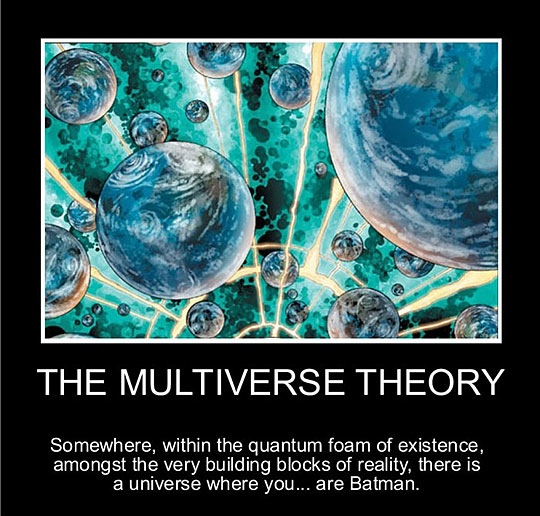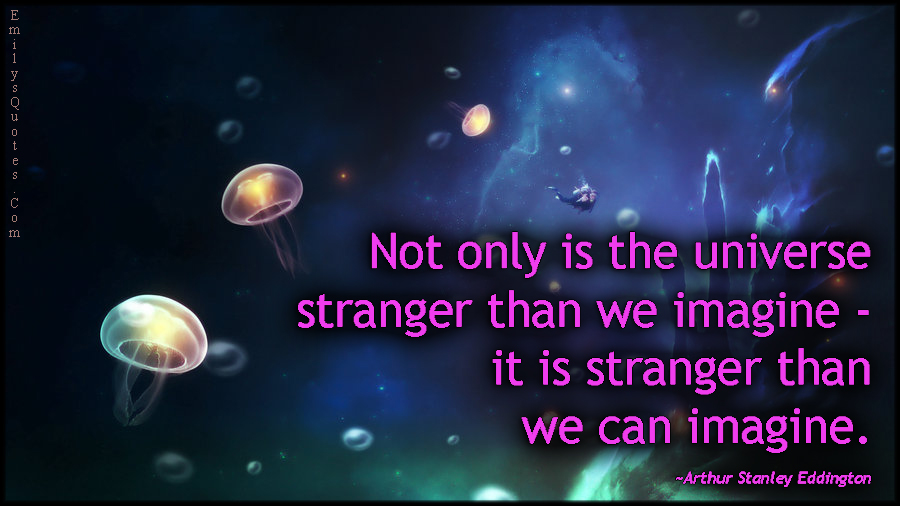
Top German Scientist Explains Why God Exists
Lasha Darkmoon
Presented with pictures, captions, and an endnote by Lasha Darmooon
BARBARA DROSSEL, Professor of Theoretical Physics at the University of Darmstadt, Germany, talks with Nigel Bovey about God and the New Physics. She believes that God is the most likely explanation for the existence of the universe and its mysterious workings.
GOD AND THE NEW PHYSICS
INTERVIEWER NIGEL BOVEY: Professor, what is theoretical physics?
 PROFESSOR BARBARA DROSSEL: It is physics done with pencil and paper and computer modelling rather than laboratory experiments. It focuses on mathematical and computational analysis to explain how and why things happen.
PROFESSOR BARBARA DROSSEL: It is physics done with pencil and paper and computer modelling rather than laboratory experiments. It focuses on mathematical and computational analysis to explain how and why things happen.
The rest of the interview will be conducted in Question and Answer form, with Nigel Bovey asking the questions (Q) and Professor Barbara Drossel (A) answering them.
Q: Why did you choose to study science?
A: I was around 13 when I decided I wanted to be a scientist. At that age, I started, or at least tried, to read about Einstein’s theory of relativity. I enjoyed reading science fiction and had a female teacher for maths and physics. She was a role model for me. I found science fascinating. Understanding nature is so rewarding. I am driven by the wish to understand it.
Q: As a scientist, you work with the laws of nature. Where did those laws come from?
A: They have been there since the origin of the Universe.
Q: How fixed are those laws?
A: The laws of physics are not an exact and complete reflection of nature. Laws of physics are an idealisation – an approximation that works very well – but they have limits in terms of validity. Newton’s laws, for example, have limits in the quantum world or in relation to relativistic speed or cosmological distances. For everyday purposes, Newton’s laws work very well.
Therefore, because the laws of nature are, at best, approximations, we should be wary of basing world views upon them. We should not invest them with authority beyond their capability. For example, people built a mechanistic world view based on Newton’s laws and said that everything runs deterministically. The advent of quantum mechanics and chaos theory showed that nature is much less predictable than that.
Q: Is it also the case that Christians should not base their theology on a particular scientific theory?
A: We need to distinguish between scientific conclusions and philosophical interpretations. Many people claim that it is a scientific conclusion that there is no God, or that if one scientific idea is true then there can be no God. This lacks honesty. That is not what science is saying; these are philosophical interpretations.
— § —
“We should be wary of basing world views upon the laws of nature…”
Q: What is your model of the origin of the Universe?
A: Big bang, followed by expansion, the formation of hydrogen atoms, stars and galaxies some 13 billion years ago. That’s the scientific explanation. As a Christian, I believe that God created the Universe and that the laws of nature come from him. He is the ultimate origin.
Some scientists look at the Universe and conclude that for life to be possible on Earth, the Universe appears to be finely tuned. Astronomer Royal Martin Rees, for example, argues that the Universe is the way it is because of just six numerical values within the laws of nature. Some people then suggest that if the Universe is finely tuned, there must be a fine-tuner, ie, God. Is that a satisfactory conclusion?
In response to this principle, astronomer Fred Hoyle, who was an atheist, said it sounded like a put-up job. To me, it is the most natural explanation – that God wanted the Universe to be such that there will be life and humankind, so he made the conditions to enable that to happen.
Q: Science tells us that the chemical elements that make up life were formed in stars. The big bang is dated in terms of billions of years, human life on earth in a shorter time-span. Why did it take so long?
A: God has time. Indeed, he is beyond time. The processes he set up are such that it takes billions of years until a star burns all its hydrogen, and then it takes the next generation of stars and maybe even a third generation.
— § —
“Believing in God makes so much sense of so many things…”
Q: Can we conclude from the fine-tuning argument that there is a God?
A: No. The fine-tuning argument is not proof. It is not science to conclude that God exists because the Universe appears to be finely tuned. But it’s a very convincing philosophical interpretation of the observation of fine-tuning.
Q: To what extent do atheist scientists use the notion of many universes – the multiverse – to explain the presence of life on Earth because they dismiss the possibility of a Creator?
A: If you start with the assumption that there is no God, then matter and natural laws are the ultimate reality. Therefore, it is not unnatural to conclude that there is a multiverse. It is always dangerous to attribute motives to other people, but I think some people are using it as an alternative to the God narrative.
I cannot completely rule out the existence of the multiverse but I just don’t think that it is plausible. And I see no reason why we should assume it exists.

Q: New atheists claim that not only are the laws of nature the ultimate reality but they are also the only reality. From that, they conclude that there is no God. Does that add up?
A: New atheists say that scientific statements are the only valid statements. But such a claim cannot itself be proven scientifically. They cannot apply the scientific method to justify the claim, so they are being inconsistent. Perhaps, also, they have too simplistic a view of science.
Q: To what extent did the big bang need a ‘Big Banger’?
A: Scientifically, not necessarily, there are other logical possibilities, many of them beyond science. We can say it just happened and we don’t know why. We can say ‘somebody’ made it happen. We could say there is a substrate such as a quantum vacuum that caused big bangs all over the place. We could say there has been a continuous cycle of big bangs.
When the big bang theory was first suggested, many scientists rejected it because they thought the Universe was eternal, because they thought there was no God and that the laws of physics had been acting eternally – the steady state theory.
Q: As a theoretical physicist, you can prove mathematical statements. The multiverse is a theory that is yet to be proved. Can you prove that God exists?
A: Physics is an empirical approach to the world. Only those things that can be tested and proved empirically fall within physics. The only field where you can do proofs is the branch of mathematics known as logic, because a proof means you deduce something from starting assumptions.
In mathematics, for example, there are axioms of geometry. Once you accept these, you can prove many things as logical deductions, where elements of the answer are already contained within the basic assumption.
God is not the object of scientific research or mathematical proofs, so we cannot prove him.
Q: If not knock-down proof, do you have evidence that God exists?
A: I think there are good reasons for believing in God. Philosophically, there are three ways in which physics raises deeper questions. First, why are there laws of nature – these underlying principles – at all? The natural explanation would be that there is a lawgiver.
Secondly, why are our minds capable of understanding these laws? To me, the plausible and convincing answer is that God wanted us to understand his thoughts.
Thirdly, why is the Universe such that life can arise? We know that the ratios of the fundamental constants must have very precisely the values they have, otherwise the whole thing fails. A purely materialistic explanation would be that our Universe is one of many universes where the ratios are different. I find theism a much more plausible explanation.
Morally, there is a deep knowledge that there is an absolute right and wrong, and that there is truth and beauty.
There are also historical arguments. My faith is based on the person of Jesus, as revealed through the Gospels. I think those accounts of his life, in particular of the Resurrection, are historically reliable.
Then there is the experience of countless people throughout history, whose lives have been changed as a result of encountering God. If there is no spiritual reality behind it, such life-changing transformation is inexplicable.
Q: Science tells us that much of our world operates invisibly. Is asking someone to believe in an unseen Creator the same as asking them to believe in the existence of the unseen power of electricity?
A: There are some similarities and some fundamental differences. Things that are investigated with scientific methods are qualitatively different from questions about God. C. S. Lewis once said that he believes in God as he believes that the sun has risen – not only because he can see the sun but also because by the light of the sun he can see other things. Believing in God makes so much sense of so many things.
Q: Your field of research is statistical physics. Are we here by design or are we the product of random accident?
A: Scientifically, a process that involves a lot of chance and some rules often gives very definite outcomes – in fact, there are chance and rules behind many patterns in nature, and we can predict these patterns.
Even though the evolutionary process has a lot of randomness in it, we cannot claim necessarily that the outcome would have been much different. There are some things that are just bound to happen. When there is a chance event, it doesn’t mean that God didn’t want it to happen this way – that’s a different level of explanation.
Q: So chance and divine purpose are not related?
A: Chance is involved in the biological process – that egg plus that particular sperm made me and not my sister. In one sense it is by chance that we are who we are and not someone different. However, that does not mean that God does not want us. He wanted humankind as a whole and he loves us individually.
We are made as social individuals who are capable of love, who know about values and who search for meaning. Deep within us there is a yearning for meaning and eternity.
Q: Stephen Hawking has been working on a ‘theory of everything’ that would unify the four fundamental forces of nature. If such a theory ever emerged, would it support the contention that science had all the answers?
A: A grand unifying theory would say that the interaction of the basic particles determines everything else that happens on the material level in the Universe. This would not mean that God does not exist but it would mean if there’s a personal God, either he would have to interfere with what the particles and forces do, and somehow introduce additional forces, or he would have to programme all his future actions into the initial state of the Universe. I do not think such a theory will be found.
The theory is a very reductionist view. Why should the particles and fundamental forces of electromagnetism and gravity be the most important reality? Those particles would not be what they are if the Universe didn’t have the symmetries, conservation laws and degrees of freedom it has. You can say the whole determines the parts, not the parts determine the whole. So, I have a completely different view of science.
Q: In the film ‘The Theory of Everything’, the Hawking character says that cosmology is the religion of the intellectual atheist. Is it?
A: Any scientific theory can be turned almost into a religion. This is not just done with cosmology, but also with complexity theory. Because there is a spiritual dimension to the Universe, there is a sense of awe and wonder. But that doesn’t mean there has to be a contradiction between science and belief in God. The question about the existence of God – the question about the ultimate reality and the basis of everything else – is completely different from scientific theorising.
Q: New atheists argue, though, that evolution is by definition atheistic and does away with the need for a Creator.
A: Such a view isn’t scientific; it’s an interpretation of the science. It is evolutionism. Science says all life has a common origin and has developed over a long process. The theory of evolution deals with the mechanisms of how species change over time. Why should this be incompatible with belief in God?

“I think there are good reasons for believing in God.”
— Prof. Barbara Drossel
Endnote by Lasha Darkmoon
When one of the world’s most renowned atheist philosophers—a man who debated God with CS Lewis at Oxford 50 years ago and was adamant that God could not possibly exist—when such a man does a complete U-turn and admits he was wrong, we have to sit up and think.
Such a man is Professor Anthony Flew, a noted scholar who straddled the worlds of philosophy and science and who died at the age of 87 in 2010.
What makes the distinguished professor’s conversion even more compelling is that his is not a religious conversion in the sense of being “born again”, or of suddenly being touched by a vague and woolly “mysticism”. On the contrary, this is a conversion based on startling new discoveries in biochemistry and DNA science that are impossible to ignore. These recent developments in science show that the unbelievable complexity of the physical world not only makes it unlikely, but also virtually impossible, that all this complexity should have arisen by mere chance and the hit-and-miss workings of evolution.
In other words, the only possible explanation for this “integrated complexity” is the existence of an Intelligent Designer.
https://www.darkmoon.me/2016/top-german-scientist-explains-why-god-exists/
